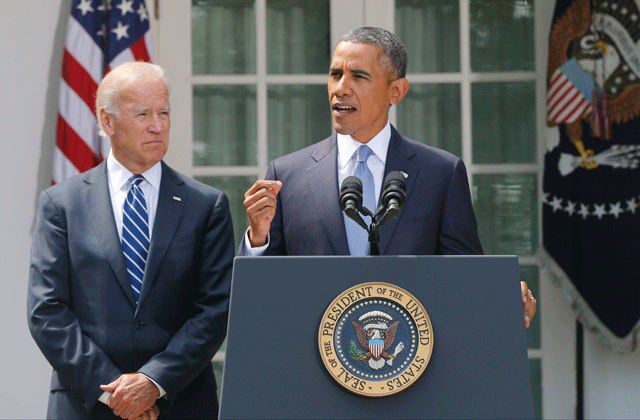
Washington: US President Barack Obama on Saturday lifted the threat of immediate punitive air strikes on Syria, even as the regime in Damascus said it was primed for any assault.
Obama said he will ask the US Congress to authorise military action after having decided to punish Syria for its alleged use of chemical weapons.
The decision represents a significant gamble for Obama, who has an estranged relationship with lawmakers, especially Republicans.
He risks suffering the same fate as British Prime Minister David Cameron, who on Friday lost his own vote on authorising military action in parliament.
"I will seek authorisation for the use of force from the American people's representatives in Congress," Obama said.
Congress is to debate Obama's decision to attack Syria during the week starting on September 9 when they return to work, its speaker said.
But the president also said he had decided that military force should be the price for what the United States says is the "undeniable" use of chemical weapons by Syria.
"Our military has positioned assets in the region," Obama said. "We are prepared to strike whenever we choose."
Syria, meanwhile, said it has its "finger on the trigger" as it braced for what it had considered an imminent Western military strike, following the departure of UN weapons inspectors.
"The Syrian army is fully ready, its finger on the trigger to face any challenge or scenario that they want to carry out," Prime Minister Wael Al Halqi said.
But UN spokesman Martin Nesirky said inspectors who spent four days investigating an alleged chemical attack last week would not issue a report on their findings until laboratory tests are conducted.
With the departure of the inspectors on Saturday opening a window for a possible US-led punitive strike, the head of Iran's elite Revolutionary Guards warned this would trigger reactions beyond the borders of Tehran's key regional ally.
"The fact that the Americans believe that military intervention will be limited to within Syrian borders is an illusion," said commander Mohammad Ali Jafari.
The inspectors, who flew to the Netherlands on Saturday, are due to report straight back to United Nations chief Ban Ki-moon and detail their conclusions on whether a poison gas attack actually did take place in Damascus suburbs on August 21.
Obama's administration says it already has firm evidence that the regime launched a chemical onslaught that killed 1,429 people, including at least 426 children.
That brought a contemptuous response from Russian President Vladimir Putin, whose country is a close ally of Syria, saying claims the regime had used chemical weapons were "utter nonsense" and demanding proof.
The US president has said he is looking at a "wide range of options" but has ruled out “boots on the ground" or a "long-term campaign."
"We are looking at the possibility of a limited, narrow act," Obama said Friday.
Syria has denied responsibility for the alleged incident and has pointed the finger of blame at "terrorists" – its term for rebels against Al Assad's forces.
In Damascus, the mood had been heavy with fear, and security forces were making preparations for possible air strikes, pulling soldiers back from potential targets.
Residents were seen stocking up with fuel for generators in case utilities are knocked out by a strike.
'If they don't show proof, there is none'
Putin demanded proof of the US charges against Damascus.
"Syrian government troops are on the offensive and have surrounded the opposition in several regions. In these conditions, to give a trump card to those who are calling for a military intervention is utter nonsense," he told journalists.
The Americans "say that they have proof, well, let them show it to the United Nations inspectors and the Security Council... If they don't show it, that means there is none."
Russia and Iran, and even some US allies, have warned against any intervention, also saying it risks sparking a wider conflict.
The United States, faced with an impasse at the Security Council and the British parliament's shock vote Thursday rejection participation, has been forced to look elsewhere for international partners.
More than a thousand anti-war protesters rallied in London's Trafalgar Square on Saturday to proclaim "victory" after the vote in parliament.
While Germany has also ruled out joining any strikes, French President Francois Hollande – whose country stridently opposed the US-led war on Iraq – distanced himself from the British vote.
Hollande said he and Obama "agreed that the international community cannot tolerate the use of chemical weapons, that it should hold the Syrian regime accountable for it."
Gruesome pictures of some of the reported victims of the attacks, including children, have shocked the world and piled on the pressure for a response.
More than 500 people, including 80 children, were killed in the attacks, according to the latest count from the Syrian Observatory for Human Rights, which said the figure had yet to be finalised.
On the military readiness front, five US destroyers carrying hundreds of cruise missiles among them are believed to be in the eastern Mediterranean readying launches against Syrian munitions depots and command and control hubs.
US forces are also stationed at air bases in Turkey, and long-range bombers could eventually be sent from bases in North America.
France has warplanes stationed in Abu Dhabi and Djibouti, and naval assets in the Mediterranean.
More than 100,000 people have died since the Syrian conflict erupted in March 2011, and two million have become refugees, half of them children, according to the United Nations.










